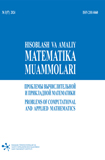Численное моделирование фильтрации подземных вод на орошаемых территориях
Ключевые слова:
концентрация, уровень грунтовых вод, насыщенность, скорость фильтрации, изменение давления, температура, оросительная водаАннотация
В статье освещены теоретические и практические аспекты построения математической модели прогнозирования движения и уровня подземных вод на основе изученной литературы. Представлена усовершенствованная математическая модель, основанная на законе Дарси и уравнении переноса и диффузии, для прогнозирования движения и уровня грунтовых вод на пахотных землях. Модель позволяет определять скорость и концентрацию подземных вод с учетом процессов конвекции и диффузии воды. Кроме того, новый подход, учитывающий минерализации воды, температуры и насыщенность почвы при расчете коэффициента водопроницаемости, формирующего распределение воды в изучаемой среде, повысил эффективность модели. С помощью модели можно добиться эффективного управления ирригационными системами и экономии водных ресурсов.
Библиографические ссылки
Ravshanov N., Daliev S., Abdullaev Z., Khafizov O. Ground and confined underground waters and their salt content // IEEE International Conference on Information Science and Communications Technologies. – 2020. – P. 1-12.
Ravshanov N., Daliev S. Non-linear mathematical model to predict the changes in underground water level and salt concentration // Journal of Physics: Conference Series. – 2020. – Vol. 1441. – Art. 012163.
Ravshanov N., Zagrebina S.A., Daliev Sh.K. Numerical simulation of unsteady underground water filtration in a porous medium // Problemy vychislitelnoy i prakdomnoy matematiki. – 2019. – No. 4. – P. 12-30.
Khabibullaev I., Murodullaev B.T., Haqnazarova D.O. Numerical modeling of groundwater filtration processes in irrigation areas // Problemy vychislitelnoy i prakdomnoy matematiki. – 2023. – No. 3(49). – P. 21-32.
Khabibullaev I., Murodullaev B.T., Haqnazarova D.O. 2023. Three-demensional mathematical model of groundwater level changes in irrigated land // Problemy vychislitelnoy i prakdomnoy matematiki. – 2023. – No. 5. – P. 44-55.
Bear J., Verruijt A. Modeling groundwater flow and pollution. Vol. 2. – Springer, 2012.
Clement T.P. RT3D—A modular computer code for simulating reactive multi-species transport in 3-dimensional groundwater aquifers / Pacific Northwest National Laboratory. –Richland, 1997. – 59 p.
Guo W., Langevin C.D. User’s guide to SEAWAT: a computer program for simulation of three-dimensional variable-density ground-water flow // US Geological Survey. – 2002. –Vol. 1, No. 434.
Harbaugh A.W. MODFLOW-2005, the US Geological Survey modular ground-water model: the ground-water flow process (Vol. 6). Reston, VA, USA: US Department of the Interior, US Geological Survey.
Hornberger G.M., Boyer E.W. Recent advances in watershed modelling // Reviews of Geophysics. – 1995. – No. 33(S2). – P. 949-957.
Dassargues A. Hydrogeology: groundwater science and engineering. – CRC Press, 2018.
McDonald M.G., Harbaugh A.W. A modular three-dimensional finite-difference groundwater flow model // US Geological Survey. – 1988.
Pinder G.F., Gray W.G. Finite element simulation in surface and subsurface hydrology. –Elsevier, 2013.
Reilly T.E., Harbaugh A.W. Guidelines for evaluating ground-water flow models. – DIANE Publishing, 2004.
Simunek J. et al. HYDRUS-1D. Simulating the one-dimensional movement of water, heat, and multiple solutes in variably-saturated media, version, 2. – 1998.
Anderson M.P., Woessner W.W., Hunt R.J. Applied groundwater modeling: simulation of flow and advective transport. – Academic press, 2015.
Bear J. Hydraulics of groundwater. Courier Corporation. – 2012.
Baeumer B., Zhang Y., Schumer R. 2013. Incorporating the influence of sub-grid heterogeneity in regional-scale contaminant transport models. arXiv preprint arXiv:1307.3303. Jul 12.
Carsel R.F., Parrish R.S. Developing joint probability distributions of soil water retention characteristics // Water resources research. – 1988. – Vol. 24. – P. 755-769.
Domenico P.A., Schwartz F.W. Physical and chemical hydrogeology. – John wiley & sons, 1997.
Gorelick S.M., Remson I., Freeze R.A. Designing Optimal Strategies for Contaminated Groundwater Remediation // Water Resources Research. – 1983.. – Vol. 19. – P. 759-778.
Harbaugh, A.W., Banta, E.R., Hill, M.C. and McDonald, M.G. 2000. Modflow-2000, the u. S. Geological survey modular ground-water model-user guide to modularization concepts and the ground-water flow process.
Spash C.L. et al. Routledge Explorations in Environmental Economics.
Kinzelbach W. Groundwater modelling: An introduction with sample programs in BASIC. – Elsevier, 1986.
Zheng C., Bennett GD. Applied contaminant transport modeling: theory and practice. –1995.

Загрузки
Опубликован
Выпуск
Раздел
Лицензия

Это произведение доступно по лицензии Creative Commons «Attribution» («Атрибуция») 4.0 Всемирная.



